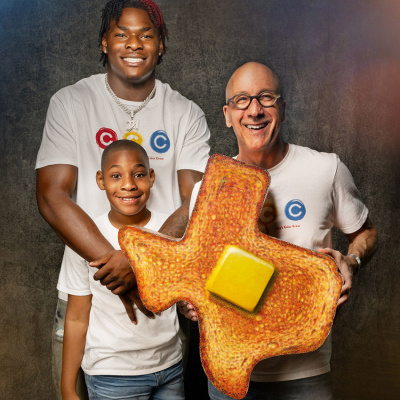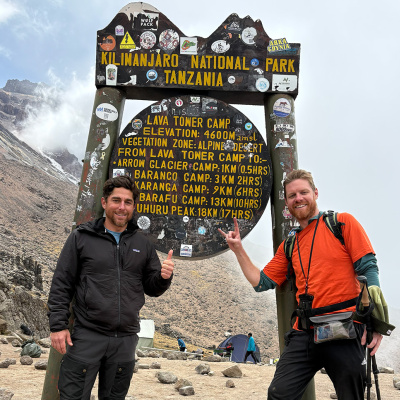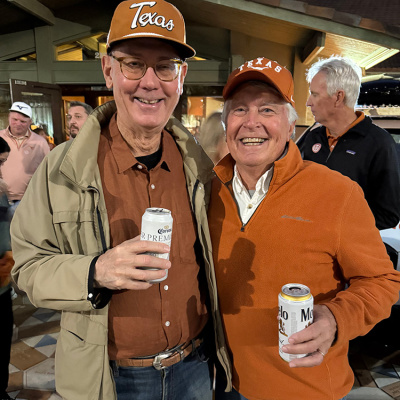How Longhorns Came Together During a Hundred-Year Storm
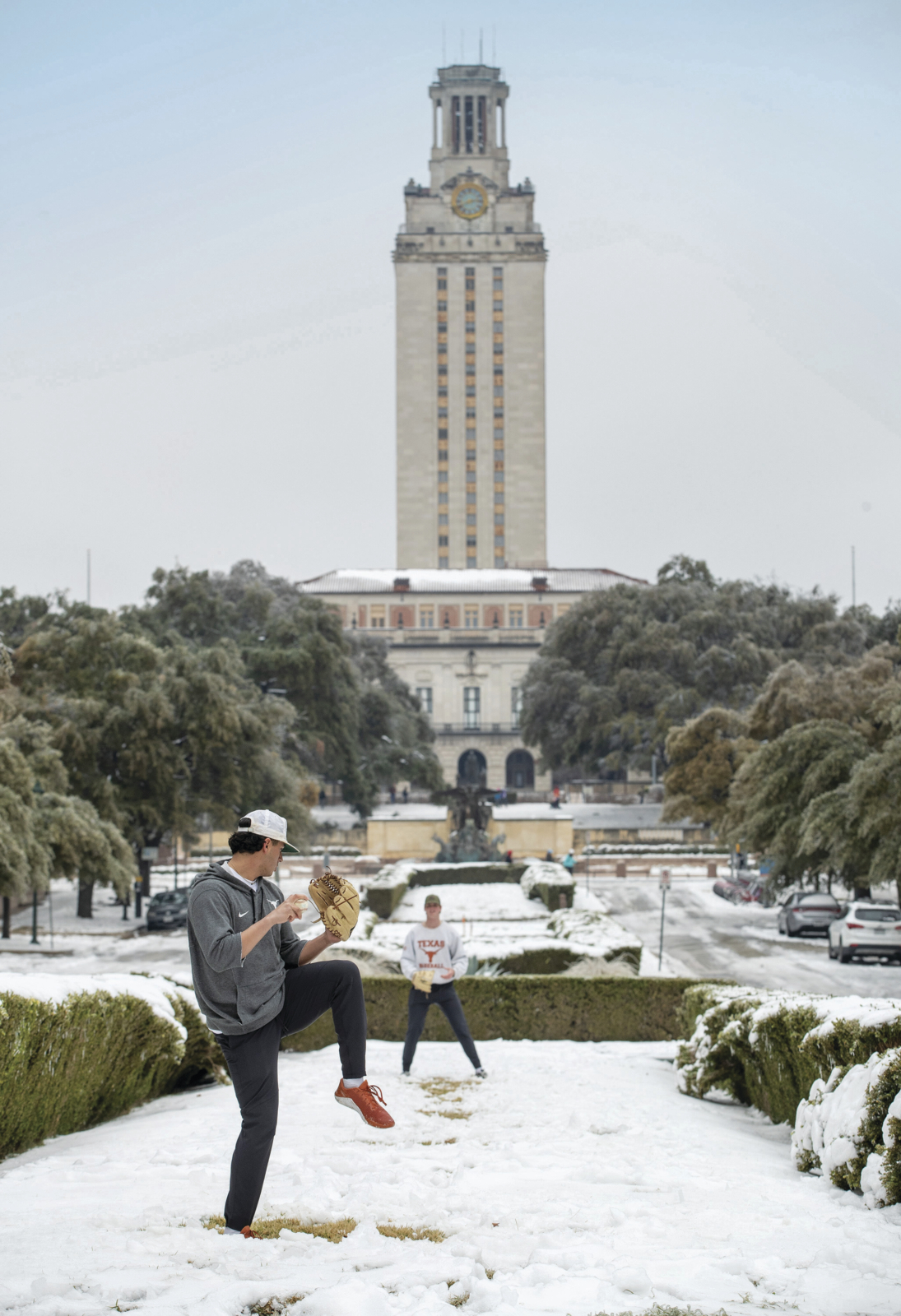
Almost a week after Winter Storm Uri devastated Texas, a long line of hungry, thirsty students snaked around the University Co-op parking lot. It was 9:45 a.m. on Saturday, February 20, and though there was still snow on the ground and the temperature hovered just above freezing, the sun was shining. It was the first moderately nice morning since the storm came.
Everyone there was waiting to meet former UT quarterback Colt McCoy, BS ’09, and other volunteers who were handing out free tacos, snacks, water, and hygiene products. McCoy was joined by a few other familiar faces—his former teammate Quan Cosby, BSW ’09, athletics director Chris Del Conte, and Texas’ new head football coach, Steve Sarkisian.
It was a relief effort that sprang from grassroots fundraising and organizing on Twitter by journalism professor Kevin Robbins. Along with student, faculty, and alumni volunteers, he financed and arranged this distribution event for UT students who were struggling with food and water insecurity due to widespread blackouts and water disruptions. That day, the volunteers fed and lifted the spirits of 250–300 Longhorns.
What began as a novelty—snow-capped hills to sled down, on paddleboards, in laundry baskets, while drinking Lone Star; icicles clinging to cactus needles; snow selfies in front of the Tower—quickly escalated to a full-scale disaster. Record-breaking low temps came to Texas (in Austin, it dropped to six degrees), and snow and ice made roads impassable. The storm knocked out the state’s electric grid, leaving millions of Texans without power. Many lost water service, and pipes froze and burst, flooding homes. As the crisis worsened over several days, food insecurity became a desperate concern as well.
On Sunday, Feb. 14, the university announced that the campus would close and classes would be suspended through at least the coming Wednesday. That’s when Robbins started worrying about students not having a safe place to stay or going hungry—and decided to do something about it. He tweeted: “Send me your Venmo, @UTAustin students affected by this. Tell me how much you had to spend on your meal. I’ll round up. Email in bio.” He was aware of the university’s emergency funds, but those things take time. You have to fill out a form online and apply for them.
“The whole idea behind this was, you tell me at 1 o’clock that you need money, and one-to-one, you’ll have it. No questions asked,” he says. “This effort felt light and nimble and unburdened by process.”
When his personal funds ran low, he shared his account details, becoming a conduit for giving. “I was getting so many modest requests from students for just small amounts of money. It was really touching,” he says, “I wanted to sustain this.” Robbins’ former students, many of them recent graduates, pitched in, too, with donations ranging from $5 to $100. Just one hour after Robbins posted in a private Facebook group he maintains to keep in touch with them, asking if anyone could make small donations to get a few more students through the next day, he’d received $800. “I almost cried,” he says.
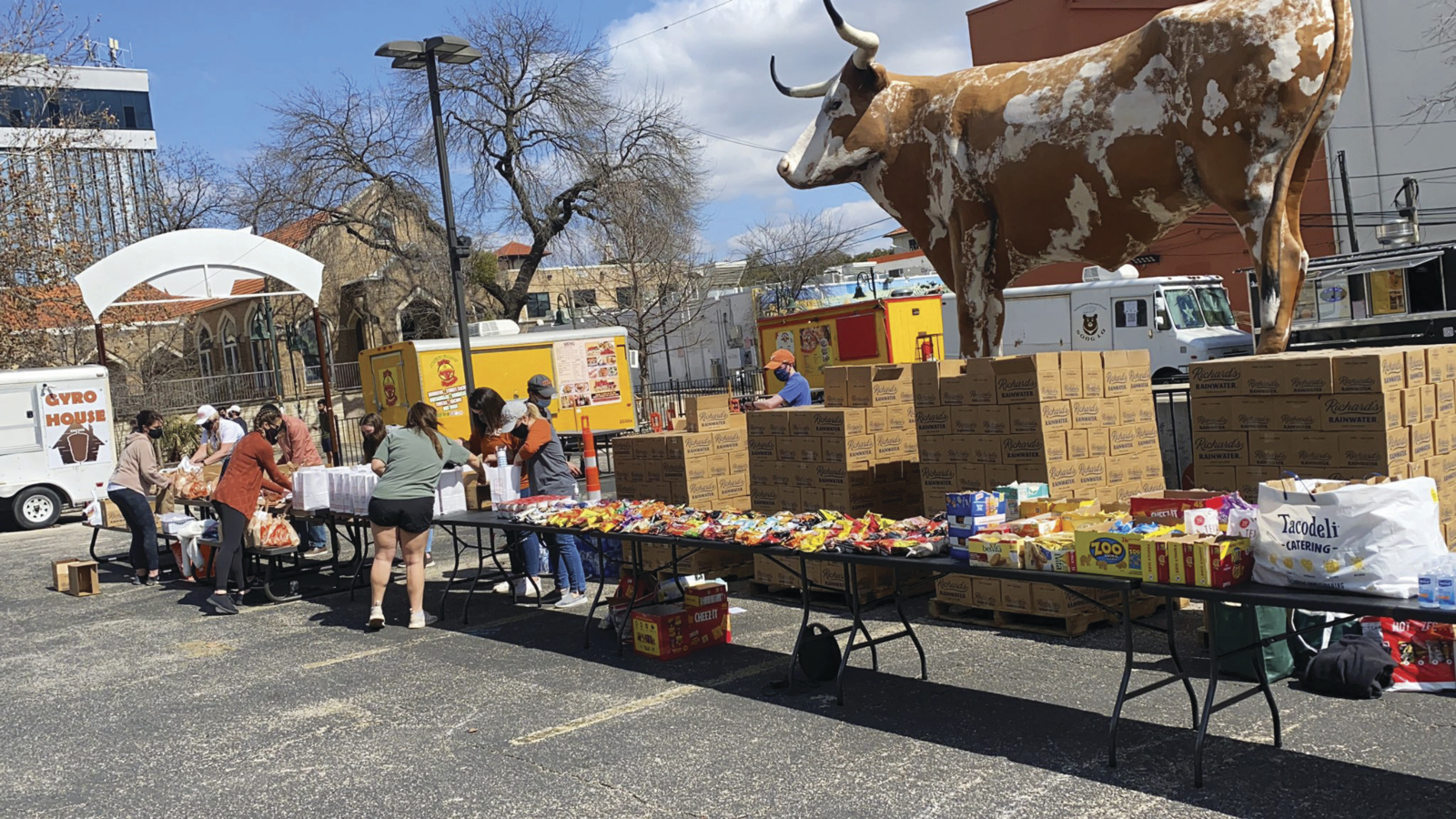
As water became even more scarce and lights were still out across the city, Robbins continued giving, $30 at a time. “Thirty dollars can go a long way when you’re desperate for water and a sandwich,” he says. He remained glued to his screen, processing requests and donations until 3:30 a.m. “It was so cool to see people rallying.”
Robbins kept posting about the relief effort under the name #AnotherDay fund. His tweets caught the eye of McCoy, whose four-year career as the Longhorns’ quarterback Robbins had covered when he was a sports reporter for the Austin American-Statesman. They kept in touch over the years, and despite dealing with a water shutdown at his own home, McCoy wanted to get involved with the grassroots effort and make a difference. He offered to split the cost of breakfast tacos with Robbins, which ended up totaling $2,000.
Joell McNew’s involvement was spurred by Robbins’ tweets, too. The president of SafeHorns, a parent-run nonprofit dedicated to improving student safety on campus, tweeted at Robbins that the No. 1 thing students needed was water. They started talking, and looped in the student organization, Horns for Safety. In a matter of hours, McNew had arranged a donation from Richard’s Rainwater of over 6,000 cans of water and secured the Co-op location. The next day, they rallied together to host the event, providing students with food, water, and a bit of cheer.
Robbins donated $300 to SafeHorns for the event, and the money was delegated to senior MaKayLa Toro and her roommate, Horns for Safety Vice President Kacey Vandervort, who did a supermarket sweep, loading up on water, juice, and hygiene products. They ordered about 700 tacos from TacoDeli and Rudy’s. Ultimately, Robbins and his donors raised $13,350.
There were many other UT alumni and faculty who jumped in to help during the crisis in any way they could, whether volunteering at food and water distribution points, or donating thousands of meals for vulnerable Texans from restaurants around the state, like former Texas defensive back Michael Huff did, BS ’05, Veronica Garza, BA ’03, and Miguel Garza, BBA ’09, JD ’12, founders of Siete Family Foods, helped feed hundreds of Austinites with the more than 1,000 meals they provided to World Central Kitchen. Matthew McConaughey, BS ’93, Life Member, Distinguished Alumnus, announced a star-studded virtual concert to benefit storm victims called “We’re Texas.”
In early March, Horns for Safety hosted a Q&A where they discussed how they maintained operations throughout the crisis. Sophomore engineering student Cameron Cummins—who, like many students, sponge bathed and rationed his drinking supply for several days throughout the crisis—was in attendance. “I understand some things are unprecedented,” he says, “but they kept referring to it as a ‘once in a generation event,’ which I disagree with. I think it’s the first in a generation. I don’t mean to bring semantics into it, but we’re probably going to experience this again. It’s kind of inevitable.”
When the next crisis comes knocking, there’s little doubt that Longhorns past and present will come through for each other again. Robbins catalyzed a whole wave of alumni giving with his fundraising and outreach; his colleagues at the journalism school, Robert Quigley and Katey Outka, BJ ’13, Life Member, made the same offer to reimburse students for the cost of their meals. Chemistry professor Kate Biberdorf was a fixture at water and food distribution events all over Austin.
“I just felt like we could take care of them in a small way. And it really wasn’t the money,” Robbins says. “I mean, I know the money meant something, but it was more like just the gesture and the suggestion and the message that people have their back.”
Credits (from top): Jay Janner, MaKayLa Toro
